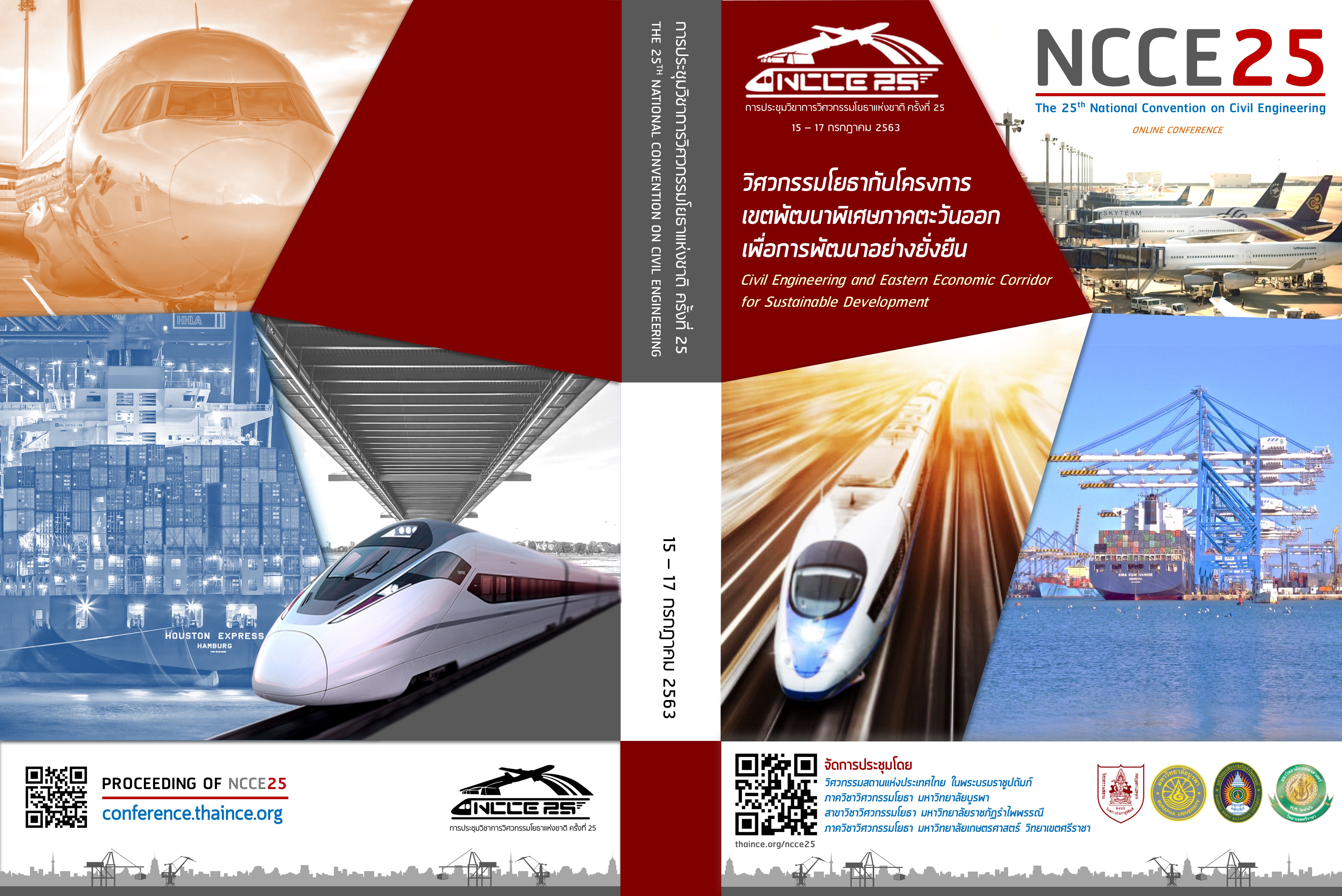ผลกระทบของซิลิก้าฟูมต่อความต้านทานการแทรกซึมคลอไรด์ของคอนกรีต
คำสำคัญ:
ความต้านทานการแทรกซึมคลอไรด์, กำลังอัด, ซิลิก้าฟูม, คอนกรีตบทคัดย่อ
งานวิจัยนี้มุ่งศึกษาความต้านทานการแทรกซึมคลอไรด์และกำลังอัดของคอนกรีตผสมซิลิก้าฟูม โดยแทนที่วัสดุประสานที่ร้อยละ 5, 7.5, 10 และ 15 โดยน้ำหนักของวัสดุประสาน ใช้อัตราส่วนน้ำต่อวัสดุประสานเท่ากับ 0.40 และ 0.50 ทดสอบการแทรกซึมคลอไรด์แบบเร่งที่ระยะเวลาบ่มน้ำ 7, 28 และ 91 วัน และทดสอบกำลังอัดของคอนกรีตที่ระยะเวลาบ่มน้ำ 7, 14, 28, 56 และ 91 วัน จากผลการทดลองพบว่า การใช้ซิลิก้าฟูมแทนที่ประสานในคอนกรีตทำให้ความต้านทานการแทรกซึมคลอไรด์ของคอนกรีตดีขึ้นและกำลังอัดของคอนกรีตสูงขึ้น โดยการใช้ซิลิก้าฟูมแทนที่ร้อยละ 15 ทำให้คอนกรีตความต้านทานการแทรกซึมคลอไรด์และกำลังอัดดีที่สุด นอกจากนี้ คอนกรีตที่ผสมซิลิก้าฟูมที่อัตราส่วนน้ำต่อวัสดุประสานต่ำมีความต้านทานการแทรกซึมคลอไรด์และกำลังอัดดีกว่าที่อัตราส่วนน้ำต่อวัสดุประสานสูง
Downloads
เอกสารอ้างอิง
[2] Tangtermsirikul, S. (2003). Durability and mix design of oncrete (1st edition). Pathum Thani: Thammasat University, Rangsit Campus.
[3] Siddiuqe, R. (2011). Utilization of silica fume in concrete: Review of hardened properties. Resource, Conservation and Recycling; 55, pp. 923-932.
[4] Barbhuiya, S. and Qureshi, M. (2016). Effect of silica fume on the strength and durability properties of concrete. CESDOC, 2016, pp. 117-120.
[5] Khan, M.I. and Siddique, R. (2011). Utilization of silica fume in concrete: Review of durability properties. Resources, Conservation and Recycling, 57, pp. 30-35.
[6] Song, H.W., Jang, J.W., Saraswathy, V. and Byun, K.J. (2007). An estimation of the diffusivity of silica fume concrete. Building and Environment, 42, pp. 1358–1367.
[7] Bagheri, A.R., Zanganeh, H. and Moalemi, M.M. (2012). Mechanical and durability properties of ternary concretes containing silica fume and low reactivity blast furnace slag. Cement and Concrete Composites, 34, pp. 663–670.
[8] American Society for Testing and Materials (ASTM). (2000). ASTM C1202, Standard test method for electrical indication of concrete's ability to. resist chloride ion penetration.
[9] British Standards (BS). BS 1881-116, Method for determination of compressive strength of concrete cubes.
[10] Soutsos, M. (2010). 1st Edition. Concrete durability. Thomas Telford Limited.
[11] Gonen, T. and Yazicioglu, S. (2007). The influence of mineral admixtures on the short and long-term performance of concrete. Build. Environ, 42, pp. 3080-3085.
[12] Gjrov, 0.E. (1993). Durability of concrete containing condensed silica fume. ACI Special Publications SP, 79, pp. 695-708.
[13] Bagheri, AR., Zanganeh, H. and Moalemi, MM. (2012). Mechanical and durability properties of ternary concretes containing silica fume and low reactivity blast furnace slag. Cement and Concrete Composites, 34, pp. 663-670.
ดาวน์โหลด
เผยแพร่แล้ว
วิธีการอ้างอิง
ฉบับ
บท
การอนุญาต
บทความทั้งหมดที่ได้รับการคัดเลือกให้นำเสนอผลงานในการประชุมวิชาการวิศวกรรมโยธาแห่งชาติ ครั้งที่ 25 นี้ เป็นลิขสิทธิ์ของ วิศวกรรมสถานแห่งประเทศไทย ในพระบรมราชูปถัมภ์



